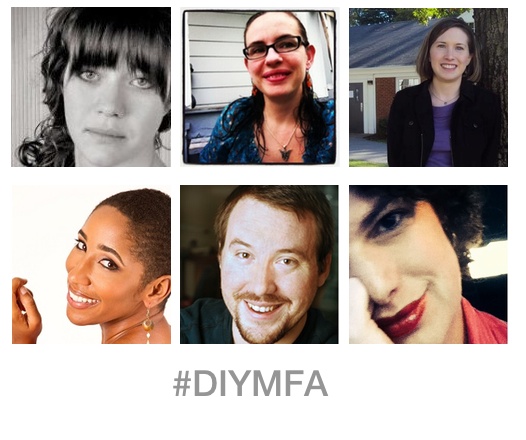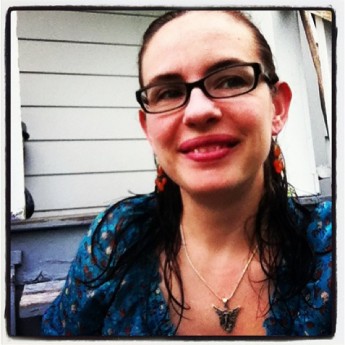At DIY MFA, we believe in the power of people. We believe there’s strength in surrounding yourself with a great team. Creativity thrives when it’s shared, and even if writers work alone, the writing life doesn’t have to be solitary. This is true for any artist, and it’s true for websites as well. As DIY MFA has grown from a tiny personal blog into a full-on writing community, with classes, articles, pod-casts and even more on the horizon, our team has grown, too.
You’ve probably already seen some new faces and voices on DIY MFA in the past month. We are so excited to officially announce the six newest members of the DIY MFA team. Stay tuned for awesome articles from these fabulous writers and newest DIY MFA team members!
Elisabeth Kauffman — Podcast Producer
Elisabeth is the producer for DIY MFA radio. She’s also a freelance editor of fiction, spending her days helping authors get to the heart of their characters. Her favorite genres to edit and read are YA fantasy, sci-fi, and romance.
After earning a degree in English Literature from Asbury University in Kentucky, Elisabeth has moved across country (five times!) and is now happy to call California home. She has worked in communications, writing articles for alumni magazines, and in the book business since 2007. When she’s not editing, Elisabeth writes her own fiction, paints in bright colors, and blogs about all things bookish at Writing Refinery. You can also find her online on Facebook or at theWriting Refinery website. She is unabashedly obsessed with board games, Doctor Who, and Harry Potter.
As podcast producer, Elisabeth does everything from helping me brainstorm ideas for episodes, helping guest speakers troubleshoot the podcast process and edit the audio so it sounds fantastic. While most of her work is behind-the-scenes, DIY MFA Radio would not be possible without all her help. Elisabeth has also written a series of articles, sharing her expertise on how to find the perfect freelance editor. You can read her first guest article here.
Robin Lovett — Columnist, “Let’s Write”
An opera singer by profession, S.A. Lovett grew tired of playing dying heroines and took up writing romance instead. Now a professed novel writing addict, she is a member of a wonderful writing group.
About S.A.’s Column: Working with other writers is an essential part of being a writer, but it can be as scary as seeking an agent and as daunting as editing an entire novel. “Let’s Write” is a column on the benefits of writers’ groups, both locally and online, with a boost of support for the trials involved. You can check out her first post here.
Sara Letourneau — Columnist, “The Soul of a Story”
Sara Letourneau is a Massachusetts-based writer who practices joy and versatility in her work. In addition to writing a fantasy novel, she reviews tea at A Bibliophile’s Reverie and is a guest contributor for Grub Street Daily. She’s also a published poet whose works have appeared in The Curry Arts Journal, Soul-Lit, The Eunoia Review, Underground Voices, and two anthologies. Learn more about Sara at her personal blog, Facebook, and Twitter.
About Sara’s Column: Ever wonder how you can weave theme into your stories? Or how to identify a story’s theme? The Soul Of A Story can help you with both! With examples of themes from published novels as well as tips and prompt ideas for your own work, we’ll explore and gain better understanding of the elusive element that’s sometimes called the “soul” of a story. Check out her first post right here.
Emily Wenstrom — Columnist, “Pixels to Platform”
Lit addict, movie junkie, geek. Emily Wenstrom is a professional writer working in PR. She edits the short story zine wordhaus, blogs about creativity at Creative Juicer, and regularly contributes to The Write Practice. In her alleged free time, she writes fantasy fiction.
About Emily’s Column: Get insights on tips tricks, and trends in social media geared toward writers from a pro in the know. This monthly column gleans from Emily’s professional experience in marketing and public relations, along with her personal experience building her own online platform for creative writing, to help other writers get the most from their digital outreach efforts. Check out her first post right here.
Kent Bridgeman — Columnist, “Swimming With the Sharks”
Kent Bridgeman is a freelance writer and marketing strategist who also writes short stories, screenplays and poetry. He helps his clients clarify their marketing messages and craft potent content. He lives in Chicago with his lovely fiancée D, and grumpy parrot Poncho. Check out his work at thewritejazz.com
About Kent’s Column: Writers are terrified of marketing. Rampant stereotypes and misconceptions abound among us creative folk. I’m pained to admit that I myself was once suffering from marketing stigma. That’s business, I used to think, how can I get it over with so I can get back to my art? It wasn’t until I landed squarely in the land of marketing strategy that I realized how creative marketing really is. “Swimming with the Sharks” sheds a light on marketing misconceptions, banishes unfounded fears and helps writers conquer the business side of writing. Check out the first post right here.
Alicia Audrey — Columnist, “Flash in the Corner”
Alicia Audrey is a writer, editor, blogger and social and political commentator living and working in Nassau, Bahamas. She enjoys writing flash fiction, and is currently working on a women’s fiction novel entitled The Whispering Willow. She prides herself on keeping the local post office open by sending far too many penpal letters and packages to friends and strangers alike on a weekly basis. Her favourite things include journals, tea, cupcakes, sarcasm, challenges, and autumn. She tweets her musings to everyone, but no one in particular, as @_AliciaAudrey.
About Alicia’s Column: Flash in the Corner is all about skillful edginess. How many words do you need to make a story sing, zing, or sting? Flash fiction is short on words and heavy in impact. The writer must capture attention, introduce a character or situation, and flip it upside-down or turn it inside-out before anyone notices a thing. Discover the power of word choice, sentence structure, sequence, and length. Challenge yourself to turn a novel-worthy story into a five-minute read. Spend a few minutes in this comfy, cozy corner and master the art of flash fiction. Check out her first post right here.













